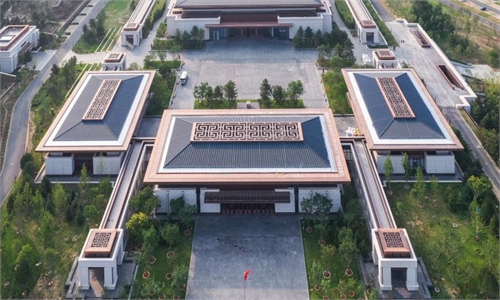ARTS / CULTURE & LEISURE
Chinese scholars assist in protecting cultural heritage in Afghanistan
In central Afghanistan's Bamyan Valley, where stands the famous Buddhas of Bamyan, Abdul Bashir Hemmat was selling tickets for the cultural heritage inside a cool ticket office instead of in the scorching sun. However, that had not always been the case.
"In the past, we worked in the sun, snow and rain," Hemmat said. Things have changed for the better after two ticket offices, which also function as cultural heritage conservation workstations in the daytime and security guard positions at night, were completed and put into use in May.
They were "built with the assistance of our Chinese friends," and "useful for us and for tourists," Hemmat said, while expressing his gratitude to a group of young scholars from China's Peking University, Lanzhou University, Wenzhou University, the Central Academy of Fine Arts and the Hong Kong-based nonprofit Friends of Dunhuang, who have financed the construction.
Bamyan Province is famous for many cultural heritages, particularly the two widely known giant Buddhas. The 53-meter- and 35-meter-tall Buddha statues, with thousands of caves for monk statues around them, are more than 1,500 years old - reminders of the influence of Buddhist culture in the region.
In 2003, the Cultural Landscape and Archaeological Remains of the Bamyan Valley were listed as a UNESCO World Heritage Site.
Nonetheless, due to years of war and economic hardships, the caves in Bamyan Valley were not numbered and cleaned for a long time, let alone being presented with an introduction.
The situation that badly hindered the heritage protection and further archaeological research has been reversed these days.
"With our specific suggestions and financial support, most of the caves near the Buddha site have been officially numbered and installed with introduction nameplates," said Shao Xuecheng, a member of Friends of Dunhuang.
"In this way, when the heritages are in urgent need of protection, security personnel can rush to the site according to the nameplates of the caves," Shao added.
In addition, the Chinese scholars funded a program to teach local children how to preserve cultural heritages.
Kids from impoverished families were invited to attend training activities on relevant knowledge by providing free bread.
"I'm thankful to our Chinese friends for providing training and assisting the children to learn how to protect and preserve cultural heritages in the future," said Ahmad Ali Hussianyar, a local archaeologist.
"Our Chinese friends have provided us with real help, and we are very grateful," said Mawlawi Saifurahman Mohammadi, Bamyan provincial director for information and culture department.
"In the past, we worked in the sun, snow and rain," Hemmat said. Things have changed for the better after two ticket offices, which also function as cultural heritage conservation workstations in the daytime and security guard positions at night, were completed and put into use in May.
They were "built with the assistance of our Chinese friends," and "useful for us and for tourists," Hemmat said, while expressing his gratitude to a group of young scholars from China's Peking University, Lanzhou University, Wenzhou University, the Central Academy of Fine Arts and the Hong Kong-based nonprofit Friends of Dunhuang, who have financed the construction.
Bamyan Province is famous for many cultural heritages, particularly the two widely known giant Buddhas. The 53-meter- and 35-meter-tall Buddha statues, with thousands of caves for monk statues around them, are more than 1,500 years old - reminders of the influence of Buddhist culture in the region.
In 2003, the Cultural Landscape and Archaeological Remains of the Bamyan Valley were listed as a UNESCO World Heritage Site.
Nonetheless, due to years of war and economic hardships, the caves in Bamyan Valley were not numbered and cleaned for a long time, let alone being presented with an introduction.
The situation that badly hindered the heritage protection and further archaeological research has been reversed these days.
"With our specific suggestions and financial support, most of the caves near the Buddha site have been officially numbered and installed with introduction nameplates," said Shao Xuecheng, a member of Friends of Dunhuang.
"In this way, when the heritages are in urgent need of protection, security personnel can rush to the site according to the nameplates of the caves," Shao added.
In addition, the Chinese scholars funded a program to teach local children how to preserve cultural heritages.
Kids from impoverished families were invited to attend training activities on relevant knowledge by providing free bread.
"I'm thankful to our Chinese friends for providing training and assisting the children to learn how to protect and preserve cultural heritages in the future," said Ahmad Ali Hussianyar, a local archaeologist.
"Our Chinese friends have provided us with real help, and we are very grateful," said Mawlawi Saifurahman Mohammadi, Bamyan provincial director for information and culture department.



